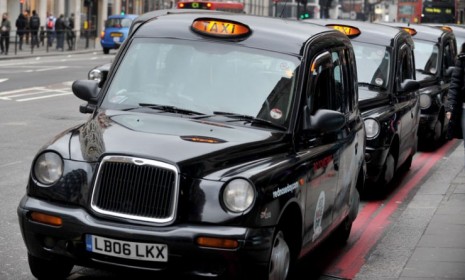Are London's iconic black taxis going extinct?
The manufacturer of the classic cab is entering the British equivalent of bankruptcy, throwing the future of the vehicles into doubt

A free daily email with the biggest news stories of the day – and the best features from TheWeek.com
You are now subscribed
Your newsletter sign-up was successful
The boxy black taxis that prowl London's streets are such an integral part of the landscape that it's hard to imagine the city without them. But imagine we must. The manufacturer of the cabs, Manganese Bronze, has announced that it is going into "administration," the British equivalent of bankruptcy proceedings. If the manufacturer, colloquially known as The London Taxi Company, can't work out a deal with creditors, the black cabs could be gone for good. Here, a guide to the possible end of an era:
What's so special about these taxis?
"There is nothing quite like riding in a London black cab," say Matthew Curtin and Marietta Cauchi at The Wall Street Journal. "The limousine-like experienced at the price of an ordinary taxi fare has long set traveling by taxi in the U.K. capital apart from squeezing into a Peugeot in Paris or a Toyota in Tokyo." The look of the most current model, the TX4, is based on the original that made its debut in 1958. "It's the classic shape," cabbie Tom Rudland tells the Journal. "Passengers want their photos taken with my cab all the time."
The Week
Escape your echo chamber. Get the facts behind the news, plus analysis from multiple perspectives.

Sign up for The Week's Free Newsletters
From our morning news briefing to a weekly Good News Newsletter, get the best of The Week delivered directly to your inbox.
From our morning news briefing to a weekly Good News Newsletter, get the best of The Week delivered directly to your inbox.
Why is the London Taxi Company in trouble?
Its "aging product line faced growing competition from Mercedes-Benz and a new taxi Nissan plans to begin selling in London next year," says John Reed at Britain's The Financial Times. Until recently, Manganese produced the only cab that could meet London's strict standards, including a "maximum 25-foot (7.5-meter) turning circle, which allows taxis to make U-turns in city streets laid out in the days of horse-drawn carriages," say Curtin and Cauchi. But that's no longer the case.
So foreign competitors drove it under?
Not entirely. Facing falling sales, Manganese Bronze started using Chinese supplies to cut costs, which may have been its undoing. Earlier this month, the company had to recall 400 TX4s because of a defect in the steering mechanism. After the recall, "shares in Manganese, which is 20 percent owned by Chinese carmaker Geely, was suspended and the 64-year-old company's survival thrown into doubt," says Reed. In addition, Manganese had gotten into trouble with shareholders for some dubious book-keeping.
A free daily email with the biggest news stories of the day – and the best features from TheWeek.com
Are the cabs' days numbered?
It depends. Manganese is in talks with Geely for a possible loan worth about $24 million, says Agence France Presse. The company said in a statement that "it remains hopeful that the fundamental strengths of the company… and its global reputation will provide the platform for a successful business in the future." The company is also apparently hoping to benefit from a nostalgic pull on people's hearts. The union representing London's taxi drivers said the cabs were "an iconic part of Britain's manufacturing heritage," and called on the government for aid.
Sources: Agence France Presse, The Financial Times, The Guardian, The Wall Street Journal
-
 What are the best investments for beginners?
What are the best investments for beginners?The Explainer Stocks and ETFs and bonds, oh my
-
 What to know before filing your own taxes for the first time
What to know before filing your own taxes for the first timethe explainer Tackle this financial milestone with confidence
-
 The biggest box office flops of the 21st century
The biggest box office flops of the 21st centuryin depth Unnecessary remakes and turgid, expensive CGI-fests highlight this list of these most notorious box-office losers